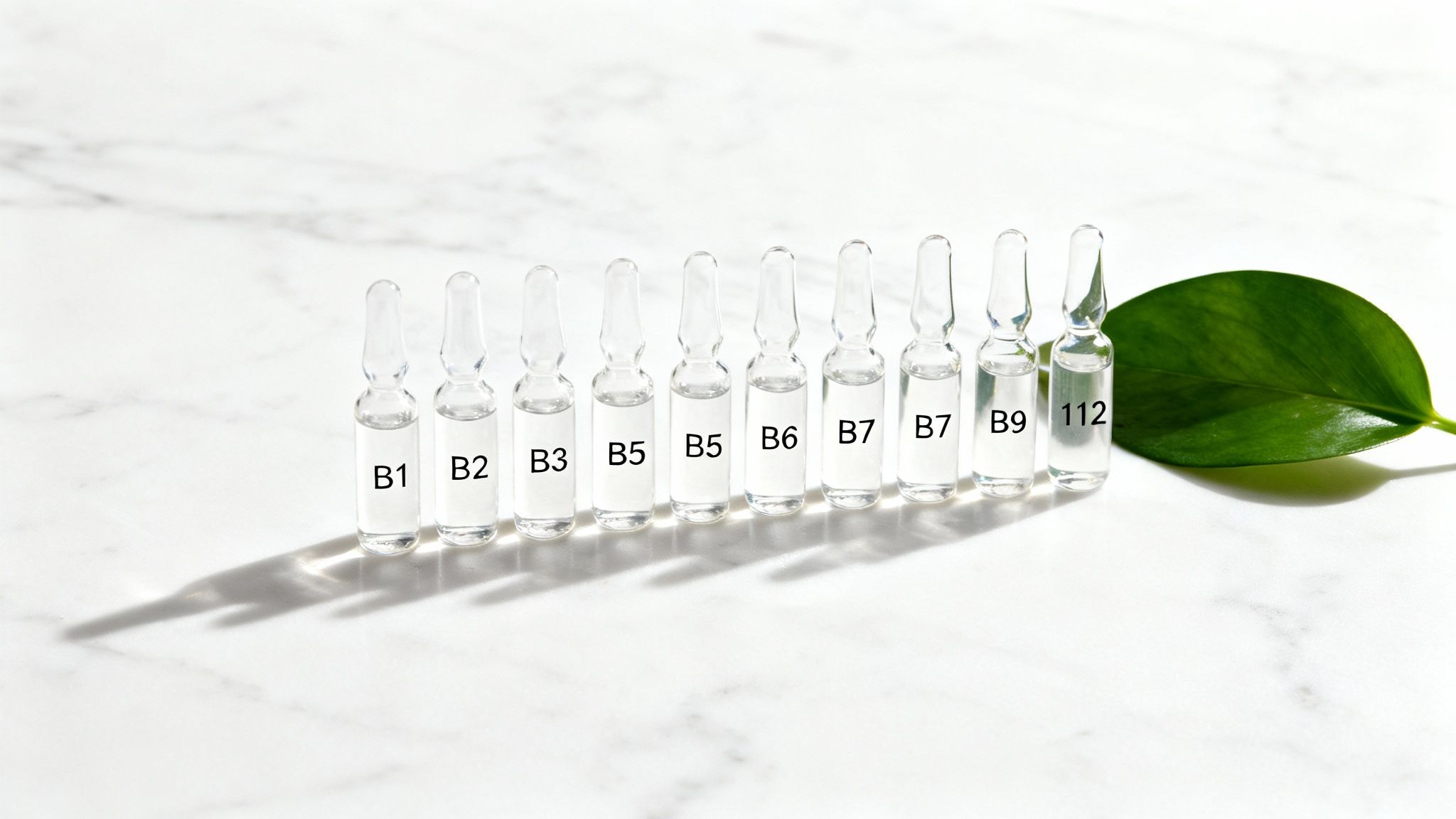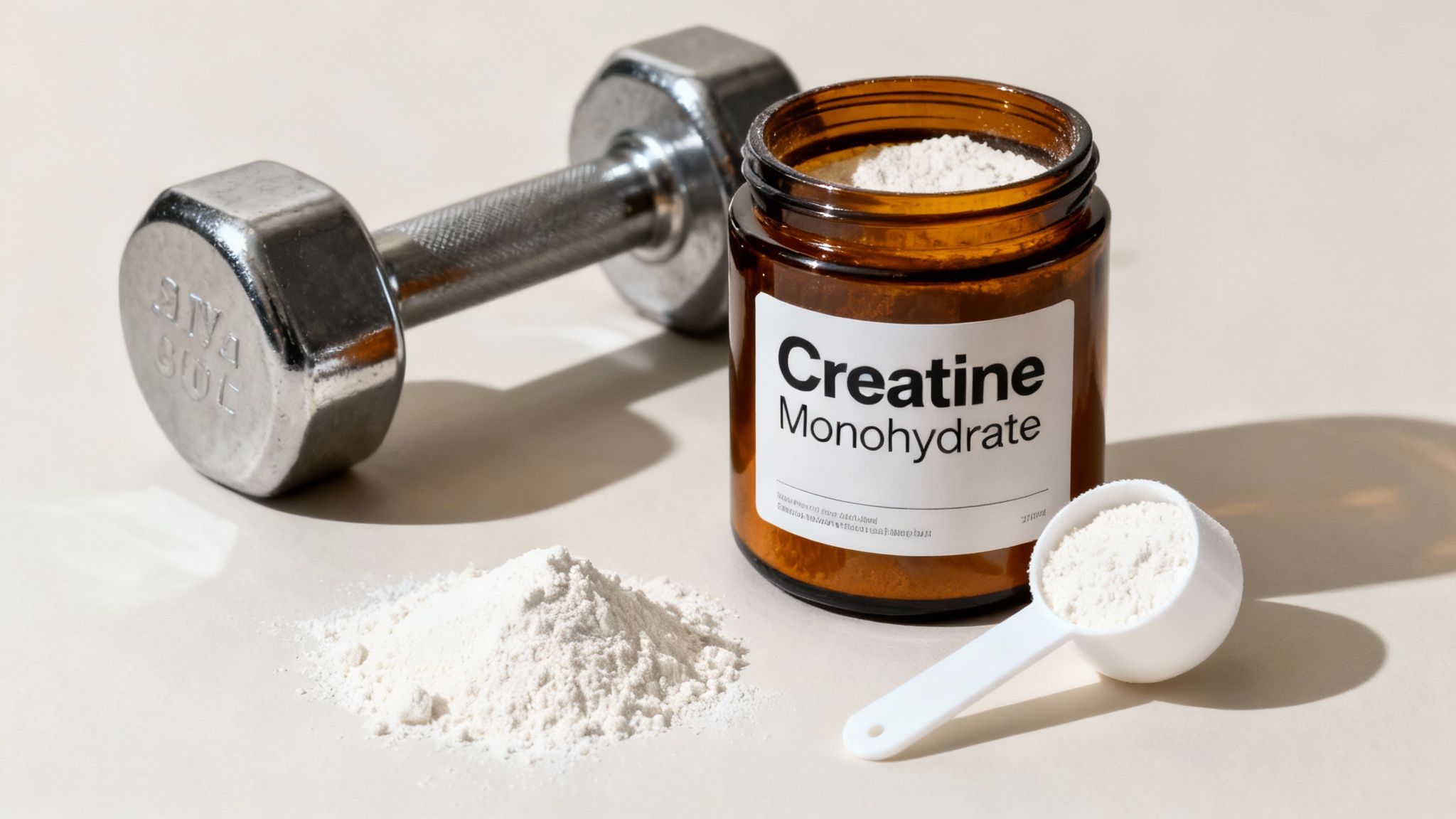
9 Best Vitamins for Energy to Beat Fatigue in 2025
Share
Feeling drained isn't just an inevitable part of modern life; it's often a clear signal that your body's energy production systems are running low on essential nutrients. While a strong cup of coffee can provide a temporary lift, true, sustained vitality comes from within, specifically from your cellular health. Your body is a complex power plant, constantly converting food into adenosine triphosphate (ATP), the high-energy molecule that fuels every thought, movement, and heartbeat. This intricate biochemical process relies heavily on a specific set of vitamins and minerals to function efficiently. When these are in short supply, the entire system slows down, leaving you feeling foggy, sluggish, and unmotivated.
This guide moves beyond generic advice to explore the most effective vitamins for energy, backed by scientific research. We'll examine how each nutrient functions at a cellular level, who might benefit most from supplementation, and how to incorporate them safely into your daily routine. For runners aiming to enhance their performance, understanding the 'real science' behind how these vitamins contribute to energy can complement broader nutrition tips to help you run faster and longer. Whether you're an athlete, a busy professional, or simply looking to reclaim your get-up-and-go, understanding these foundational nutrients is the first step toward lasting energy and peak performance.
1. B-Complex Vitamins: The Engine Room of Energy Production
Often called the 'spark plugs' of our cells, the B-vitamin family is fundamental to how our bodies produce energy. This group, which includes eight distinct vitamins like B6 and B12, acts as essential co-workers in our metabolism. They help your body efficiently convert the carbohydrates, proteins, and fats you consume into adenosine triphosphate (ATP), the primary energy currency for every cell. A good multivitamin will often cover your daily needs for these crucial nutrients.

Because B vitamins are water-soluble, your body doesn't store them for long periods. This means a consistent daily supply through diet or supplementation is crucial to keep your energy engine running smoothly and avoid the fatigue associated with deficiency. This is especially true for B12, as a shortage can lead to significant tiredness; you can discover the key signs of vitamin B12 deficiency to see if you might be at risk.
How to Use B-Complex Vitamins Effectively
To maximise the benefits of B-complex vitamins for energy, timing and form are key. Consider an office worker struggling with the classic 3 PM slump who finds renewed focus after incorporating a B-complex supplement or a high-quality multivitamin into their morning routine.
- Timing is Key: Take your B-complex supplement in the morning with your breakfast. This aligns with your body's natural energy production cycle and can help prevent any potential interference with sleep.
- Choose Superior Forms: Opt for supplements containing 'methylated' or 'active' forms, such as methylcobalamin (B12) and methylfolate (B9). These versions are body-ready and offer superior absorption.
- Food First: You can find B vitamins in whole grains, meat, eggs, dairy, legumes, and dark leafy greens. However, a balanced B-complex supplement ensures you get an effective dose of all eight.
- Balance is Better: Look for a well-rounded formula rather than one with excessively high doses of just one or two B vitamins, as they work best together.
2. Coenzyme Q10 (CoQ10): The Cellular Powerhouse
Coenzyme Q10, or CoQ10, is a potent, vitamin-like antioxidant that your body produces naturally. It resides in the mitochondria, the power plants of your cells, where it plays a non-negotiable role in generating up to 95% of your body's energy. It is a critical component of the electron transport chain, the final step in creating cellular fuel (ATP).
As a fat-soluble compound, CoQ10 is crucial for high-energy organs like the heart and muscles. However, natural levels tend to decline with age, and certain medications like statins are known to deplete it, often leading to fatigue. Supplementing with CoQ10 can help recharge these cellular batteries, making it one of the most effective compounds to consider when looking for vitamins for energy.
How to Use CoQ10 Effectively
To harness the full energy-boosting potential of CoQ10, absorption and consistency are paramount. Imagine an older adult struggling with performance who regains stamina after consistently taking CoQ10, or a statin user who finds their energy levels returning to normal.
- Take with a Meal: Consume your CoQ10 supplement with a meal containing fats, such as avocado, nuts, or omega-3-rich oily fish, to significantly enhance its absorption.
- Choose the Right Form: For individuals over 50 or those with absorption issues, the ubiquinol form of CoQ10 is generally more bioavailable and recommended over the more common ubiquinone form.
- Be Patient and Consistent: It can take between four to eight weeks of daily supplementation to notice significant improvements in your energy levels as your cellular stores are replenished.
- Consult Your Doctor: If you are taking statins for cholesterol management, discuss adding a CoQ10 supplement with your healthcare provider to counteract potential depletion and associated fatigue.
3. Iron: The Oxygen Transporter for Cellular Energy
If your body is an engine, iron is the mineral that delivers the oxygen vital for combustion. It's a critical component of haemoglobin, the protein in your red blood cells that ferries oxygen from your lungs to every tissue, and myoglobin, which stores oxygen in your muscles. Without sufficient iron, this oxygen delivery system falters, leading to profound fatigue and exhaustion.
Iron deficiency anaemia is one of the most widespread nutritional disorders and a leading cause of low energy levels, particularly impacting women's health. Restoring iron levels is fundamental for anyone experiencing this type of fatigue, as it directly impacts your body's ability to produce energy at a cellular level. It is a cornerstone mineral for maintaining vitality, and you can explore how iron works with other key vitamins for a synergistic energy boost.
How to Use Iron Effectively
To harness the energy-boosting power of iron, smart supplementation is essential to maximise absorption and minimise side effects. Imagine a female athlete experiencing unexplained tiredness who discovers, through blood work, that her iron stores are depleted. By strategically adding an iron supplement with vitamin C, she regains her stamina and performance.
- Confirm with a Test: Before starting supplementation, always get a blood test (checking ferritin, serum iron, and TIBC) to confirm a deficiency. Taking iron when not needed can be harmful.
- Pair with Vitamin C: Take your iron supplement with a source of vitamin C, such as a glass of orange juice. This can enhance absorption by up to 300%, making it a crucial tip for effectiveness.
- Time it Right: For best results, take iron on an empty stomach. However, if this causes discomfort, taking it with a small meal is acceptable. Avoid taking it with calcium, coffee, or tea, as they inhibit absorption.
- Choose Wisely: Opt for ferrous forms (like ferrous sulphate or ferrous gluconate) over ferric forms, as they are generally more bioavailable and easily absorbed by the body.
4. Magnesium Complex: The Relaxation Mineral for Sustainable Energy
Magnesium is an essential mineral that acts as a vital partner in over 300 biochemical reactions within the body, many of which are central to energy creation. It plays a direct role in producing ATP, our cellular fuel, yet deficiency is widespread. It also governs muscle function, nervous system activity, and sleep quality, all of which are critical for restoring your energy levels.

Unlike stimulating supplements, magnesium supports energy by enhancing rest and recovery, which is crucial for balancing hormones and managing stress. A deficiency can leave you feeling perpetually tired, wired, and unable to switch off. For true revitalisation, deep rest is non-negotiable, and magnesium is the key that unlocks it. Alongside supplementation, exploring practices like energy healing and bodywork for deep relaxation can profoundly improve your body's capacity for recovery.
How to Use Magnesium Complex Effectively
To leverage magnesium for better energy, optimising its form and timing is crucial for recovery and relaxation. Consider an athlete who uses magnesium glycinate after intense training sessions to reduce muscle soreness and improve sleep, waking up more refreshed and ready for the next day.
- Choose Wisely: Opt for highly absorbable forms like glycinate, threonate, or malate. Avoid oxide and carbonate forms, which have poor bioavailability and are more likely to cause a laxative effect.
- Time it for Relaxation: Take your magnesium supplement in the evening, about an hour before bed. This can promote relaxation and improve sleep quality, which is fundamental for next-day energy. You can discover the best time to take magnesium for your specific goals.
- Dose Correctly: A typical dose is 200-400 mg per day. It's best to start with a lower dose and gradually increase it to find what works best for you without causing digestive discomfort.
- Be Mindful of Interactions: Take magnesium at least two hours apart from other medications, especially antibiotics and bisphosphonates, to ensure proper absorption of both.
5. Ashwagandha: The Adaptogenic Energiser
A cornerstone of Ayurvedic medicine, ashwagandha is a powerful adaptogenic herb celebrated for its ability to enhance stamina and fight fatigue. It contains active compounds called withanolides that help regulate your body's stress response and support mitochondrial function.
By modulating the hypothalamic-pituitary-adrenal (HPA) axis, your central stress response system, ashwagandha helps build resilience against physical and mental exhaustion. This makes it a standout choice not just as a quick fix, but as a long-term strategy for sustained energy and hormonal balance, making it a key component in any discussion about natural aids for energy.
How to Use Ashwagandha Effectively
To harness the full potential of ashwagandha, it's crucial to consider the type, standardization, and timing. For instance, a professional dealing with high stress might use a KSM-66 or Sensoril extract to mitigate energy loss from a demanding schedule, finding it helps maintain calm focus and performance.
- Timing is Key: Ashwagandha can be taken in the morning to help manage daytime stress or in the evening to promote restful sleep. Your personal response will dictate the best time.
- Choose Standardised Extracts: Look for supplements standardized to a certain percentage of withanolides, such as KSM-66 or Sensoril, to ensure you are getting a potent and effective dose.
- Dose Appropriately: A typical dose is 300-600mg of a standardised extract per day. Start at the lower end to assess your tolerance.
- Cycle Your Use: To maintain its effectiveness, consider cycling your intake. A common approach is taking it for two to three months, followed by a one-month break.
6. Mushroom Blends: The Adaptogenic Powerhouse
Functional mushroom blends, featuring varieties like Cordyceps and Lion's Mane, are gaining recognition for their profound impact on energy and cognitive performance. Cordyceps is particularly known for its ability to improve the body's production of ATP, enhancing oxygen utilization and physical stamina. Lion's Mane supports nerve growth factor (NGF), which is crucial for brain health and mental clarity.
These adaptogenic fungi work by helping the body adapt to physical and mental stressors, improving resilience and preventing the energy drain associated with fatigue. Combining them in a blend offers a synergistic approach to boosting both physical vitality and cognitive function, making them a popular choice in modern energy powders.
How to Use Mushroom Blends Effectively
To get the most from these powerful fungi, consistency and quality are essential. Imagine a creative professional using a mushroom blend to overcome mental fog and enhance focus, or an athlete using it to improve endurance during training.
- Look for Fruiting Body Extracts: Ensure your supplement is made from the 'fruiting body' of the mushroom, not just the mycelium, as this part contains the highest concentration of active compounds.
- Consistency is Crucial: Adaptogenic mushrooms work best when taken consistently over time. Incorporate your blend into a daily routine, such as in your morning coffee or smoothie.
- Check for Beta-Glucans: High-quality products will often list the percentage of beta-glucans, the primary active compounds. Look for extracts with a high beta-glucan content for maximum benefit.
- Start with a Low Dose: Begin with the recommended dose on the product label and adjust as needed based on your individual response.
7. Omega-3 Fatty Acids: Fuel for Brain and Body
Omega-3 fatty acids, particularly EPA and DHA found in fish oil, are essential for cellular health and play a key role in energy production. They are integral components of cell membranes, including those in our brain and muscle cells, ensuring they function optimally. By reducing inflammation and improving blood flow, omega-3s help deliver oxygen and nutrients more efficiently, which is vital for sustained energy.
Furthermore, these healthy fats are crucial for cognitive performance, helping to combat the mental fog that often accompanies physical fatigue. For those seeking long-term vitality and brain health, a high-quality omega-3 supplement is a foundational piece of the energy puzzle.
How to Use Omega-3s Effectively
To leverage omega-3s for better energy and cognitive function, focus on the dose and source. Think of a student who finds their concentration improves during long study sessions after adding a high-DHA fish oil to their daily regimen.
- Focus on EPA & DHA: Look at the supplement facts panel for the combined total of EPA (eicosapentaenoic acid) and DHA (docosahexaenoic acid). A daily dose of 1,000-2,000 mg is often recommended for general health.
- Take with Food: Consuming your omega-3 supplement with a meal that contains fat can enhance its absorption.
- Choose a Quality Source: Opt for omega-3s from wild-caught, small, oily fish (like sardines or anchovies) to minimize exposure to contaminants like mercury. Look for third-party testing seals for purity.
- Be Consistent: Like many supplements for energy, the benefits of omega-3s are cumulative. Take it daily to support your cellular health over the long term.
8. Creatine Monohydrate: The High-Speed Energy Reservoir
While often associated with athletes and bodybuilders, creatine monohydrate is a powerful compound for anyone seeking a rapid energy boost for both fitness and cognitive performance. It's a naturally occurring substance found in muscle cells that helps replenish your body's most immediate energy source, adenosine triphosphate (ATP). By serving as a quick-access phosphate donor, creatine supercharges your cells' ability to produce energy during short, intense bursts of effort.
Although your body produces some creatine and you can get it from red meat, supplementation is the most effective way to saturate your muscle and brain stores. This makes creatine a standout among supplements for energy, not just for improving power output in the gym but also for combating cognitive fatigue and maintaining mental sharpness throughout a demanding day. Many energy powders now include creatine for its proven benefits.
How to Use Creatine Monohydrate Effectively
To get the most out of creatine, consistent use and proper hydration are paramount. Imagine a busy professional who, after supplementing with creatine, notices they have more mental stamina to tackle complex projects in the afternoon and more power during their evening spin class.
- Consistent Daily Dose: For gradual benefits without a loading phase, take a daily dose of 3-5 grams. This is a simple and effective strategy for long-term use.
- Optional Loading Phase: To saturate your muscles more quickly, you can "load" with 20 grams per day (split into four 5-gram doses) for 5-7 days, followed by a 3-5 gram daily maintenance dose.
- Enhance Absorption: Take your creatine with a source of carbohydrates and protein, such as in a post-workout shake or with a meal. This can improve its uptake into muscle cells.
- Stay Hydrated: Creatine draws water into your muscles, so it's vital to increase your water intake. Aim for an extra 20-30% more water than usual to stay well-hydrated.
- Choose Monohydrate: Creatine monohydrate is the most extensively researched and proven form. Micronised versions can offer better mixability if you find standard monohydrate gritty.
9. L-Carnitine: The Cellular Energy Transporter
L-carnitine is a vital amino acid-like compound that functions as a cellular taxi service, transporting fatty acids into the mitochondria to be burned for fuel. This process is fundamental for sustained energy production, particularly during physical activity. By facilitating the conversion of fat into usable energy, L-carnitine not only helps combat fatigue but also supports exercise performance and recovery.

While your body can produce L-carnitine, certain factors like intense training, ageing, or a plant-based diet can lead to lower levels, making supplementation a practical strategy to enhance your energy reserves. If you’re looking to improve endurance and tap into your fat stores for fuel, incorporating this powerful compound can be a game-changer for your daily vitality and fitness goals.
How to Use L-Carnitine Effectively
To get the most out of L-carnitine, understanding its relationship with food and exercise timing is crucial. Imagine a gym enthusiast who takes L-carnitine before their workout and notices they can push through longer sets with less fatigue, tapping into a new level of performance.
- Pair with Carbs: For optimal absorption into muscle tissue, take your L-carnitine supplement with a meal containing carbohydrates. This stimulates an insulin response, which helps shuttle L-carnitine into your cells where it’s needed most.
- Time it Before Exercise: Consume L-carnitine about 30-60 minutes before your workout to allow it to become available for fat-to-energy conversion during physical activity.
- Find Natural Sources: While supplements are effective, L-carnitine is abundant in red meat, particularly beef and lamb. Smaller amounts are also found in fish, poultry, and dairy products.
- Choose the Right Form: Look for L-carnitine L-tartrate, a form well-regarded for its fast absorption rate, making it an excellent choice for fitness and energy applications. Acetyl-L-carnitine is another popular form known for its additional cognitive benefits.
9-Item Energy Vitamins & Supplements Comparison
| Item | Complexity (🔄) | Resource Requirements (⚡) | Expected Outcomes (📊) | Ideal Use Cases (💡) | Key Advantages (⭐) |
|---|---|---|---|---|---|
| B-Complex Vitamins | 🔄 Low — simple oral dosing | ⚡ Low — inexpensive, widely available | 📊 Moderate–High — supports ATP, mood; effects in days–weeks | 💡 General fatigue, poor diet, vegans (B12), athletes | ⭐ Proven for energy metabolism; safe; rapid effects |
| Coenzyme Q10 (CoQ10) | 🔄 Medium — fat-soluble form choice (ubiquinol vs ubiquinone) | ⚡ Medium–High — costlier; take with fat; 4–8 weeks to effect | 📊 Moderate–High — strong for age/statin-related decline, cardiovascular support | 💡 Older adults, statin users, endurance athletes, heart conditions | ⭐ Potent mitochondrial support; antioxidant; heart benefits |
| Iron & Iron-Rich Formulas | 🔄 Medium–High — requires blood testing and tailored dosing | ⚡ Medium — low supplement cost but needs monitoring, manage GI effects | 📊 High (if deficient) — corrects anemia and restores energy relatively quickly | 💡 Menstruating women, pregnant/postpartum, vegetarians, diagnosed anemia | ⭐ Addresses root cause of common fatigue; clear clinical guidelines |
| Magnesium Complex | 🔄 Low–Medium — select appropriate form (glycinate/threonate/malate) | ⚡ Low–Medium — affordable; form-dependent bioavailability; 2–4 weeks | 📊 Moderate — improves sleep, recovery, reduces cramps and fatigue perception | 💡 Sleep issues, stress-related fatigue, athletes, migraine-prone individuals | ⭐ Broad enzymatic support; improves recovery and sleep quality |
| Ashwagandha | 🔄 Medium — standardization and cycling recommended | ⚡ Medium–High — quality varies; higher cost for premium extracts | 📊 Moderate — reduces fatigue ~20–30% over weeks; stress & hormone support | 💡 Stress-related fatigue, hormonal imbalance, periods of high demand | ⭐ Adaptogen with clinical support; enhances resilience and cognition |
| Mushroom Blends | 🔄 Low–Medium — choose fruiting body extracts | ⚡ Medium — quality varies; effects in 2–3 weeks | 📊 Moderate–High for cognitive & physical stamina — mood and focus gains | 💡 Mental fog, athletic performance, immune support, general vitality | ⭐ Synergistic effects; supports both brain and body energy systems |
| Omega-3s | 🔄 Low — simple dosing with food | ⚡ Low–Medium — cost depends on quality; long-term use | 📊 Moderate — improves cognitive function, reduces inflammation | 💡 Brain fog, inflammatory issues, general wellness, cognitive performance | ⭐ Foundational for cell health; strong anti-inflammatory benefits |
| Creatine Monohydrate | 🔄 Low — simple dosing (loading optional) | ⚡ Low — inexpensive; daily maintenance; hydration needed | 📊 High — improves high-intensity performance 5–15% and cognitive energy | 💡 Athletes, aging adults, vegetarians/vegans, cognitive fatigue research | ⭐ Extremely well-researched; effective, safe, cost‑effective |
| L-Carnitine / ALCAR | 🔄 Medium — form (L‑carnitine vs ALCAR) and dosing considerations | ⚡ Medium — moderate cost; several weeks for effect; may pair with carbs/CoQ10 | 📊 Moderate — enhances endurance and cognitive energy, especially if low baseline | 💡 Endurance athletes, aging adults, vegetarians/vegans, cognitive fatigue | ⭐ Supports fatty-acid transport to mitochondria; cognitive benefit with ALCAR |
Building Your Personalised Energy Stack
Navigating the world of supplements to find the right vitamins for energy can feel overwhelming, but the solution isn't a one-size-fits-all magic pill. True, sustainable vitality comes from a strategic and personalised approach. This journey begins with understanding how different nutrients function within your body’s complex energy production systems.
From the foundational role of B-complex vitamins in converting food into fuel, to the cellular powerhouse support of CoQ10 and L-carnitine, each compound offers a unique pathway to enhanced energy. We've seen how essential minerals like iron and magnesium are critical for oxygen transport and metabolic function, and how deficiencies can be a primary cause of persistent fatigue.
But optimising energy goes beyond basic metabolic support. It also involves managing your body’s response to stress and physical demands. This is where adaptogens like ashwagandha and functional mushroom blends shine, helping to build resilience and combat the burnout so common in modern life. For those with active lifestyles, creatine offers a well-researched method for boosting short-term power and overall physical capacity.
Key Takeaways for Your Energy Strategy
To move forward, consider these actionable steps:
- Assess Your Lifestyle: Are you an athlete, a busy professional, or someone managing chronic stress? Your daily demands dictate your nutritional needs. Intense physical activity might point towards creatine and L-carnitine, while a high-stress job could benefit more from magnesium and adaptogens.
- Start with the Foundations: Before adding specialised supplements, ensure your core nutritional bases are covered. A high-quality multivitamin, magnesium, and omega-3s are excellent starting points for almost everyone seeking to boost their energy.
- Listen to Your Body: Introduce new supplements one at a time and pay close attention to how you feel. This methodical approach helps you identify what truly works for your unique physiology, avoiding a scattergun approach that can be both ineffective and costly.
- Prioritise Holistic Health: Remember that even the best vitamins for energy cannot replace the cornerstones of good health. Prioritise consistent sleep, a balanced diet rich in whole foods, regular physical activity, and effective stress management techniques. Supplements are designed to support these pillars, not replace them.
By viewing these vitamins, minerals, and compounds as tools in your wellness toolkit, you can move from simply guessing to strategically building a routine that addresses your specific energy deficits. This empowers you to create a robust, personalised system that supports lasting vitality and helps you perform at your best, day in and day out.
This article is for informational purposes only and is not medical advice. Always consult a qualified health professional before starting any new supplement or major lifestyle change.
Ready to stop guessing and start building your perfect energy stack? The AI-powered platform at VitzAi.com analyses your unique lifestyle, diet, and health goals to create a personalised supplement plan just for you. Take our free health assessment today at VitzAi.com and discover the precise nutrients your body needs to thrive.
